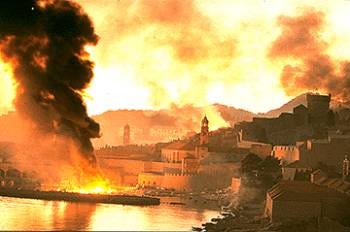The wars of the breakup of the former Yugoslavia brought death and destruction to the region on a scale not seen in Europe since the end of World War II. 1
The siege of the medieval walled city of Dubrovnik, Croatia2 by the Serb-led Yugoslav People's Army (JNA) lasted from October 1991 until early 1992.
The library of the Inter-University Centre, an independent research institute established in 1971, was bombarded with incendiary munitions on December 6, 1991, and was burned, its collection of 30,000 volumes a total loss.
On 31 January 2005, the Trial Chamber of the International Criminal Tribunal for the former Yugoslavia sentenced retired General Pavle Strugar of the Yugoslav Peoples’ Army to eight years in prison for war crimes perpetrated in 1991. He has been found guilty of war crimes against the civilian population and, under Article 3(d) of the Tribunal’s Statute, of the destruction of and wilful damage to a number of historical and cultural sites located in the Old Town of Dubrovnik, in Croatia, a site inscribed on the List of World Heritage since 1979.3
Riedlmayer, András J. "Crimes of War, Crimes of Peace: Destruction of Libraries during and after the Balkan Wars of the 1990s." Library Trends, vol. 56 no. 1, 2007, p. 107-132. (An earlier version of this paper was presented at the American Library Association Library History Roundtable's Library History Seminar XI: Libraries in Times of War, Revolution and Social Change, held at the University of Illinois at Urbana-Champaign, October 27-30, 2005).
Old City of Dubrovnik. The 'Pearl of the Adriatic ‘ UNESCO World Heritage Site. Inscribed, 1979.





